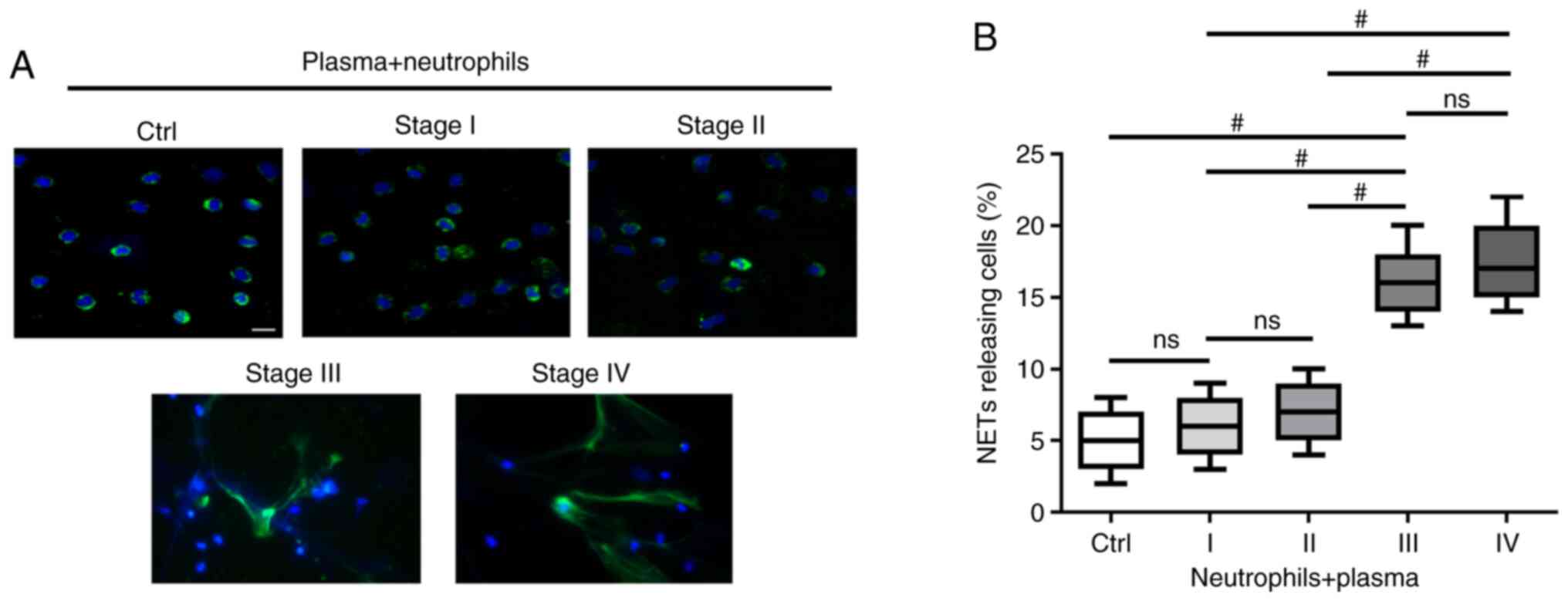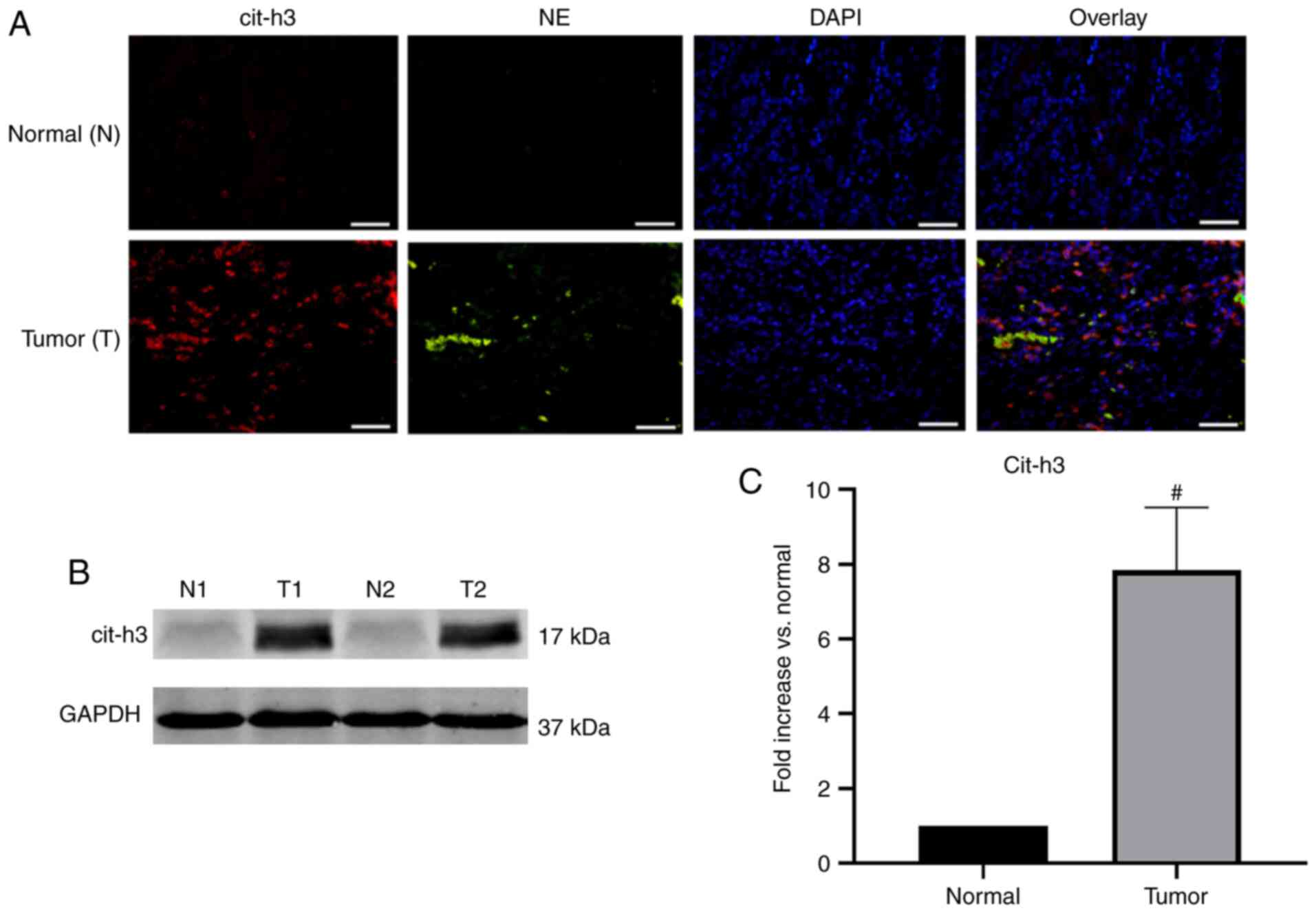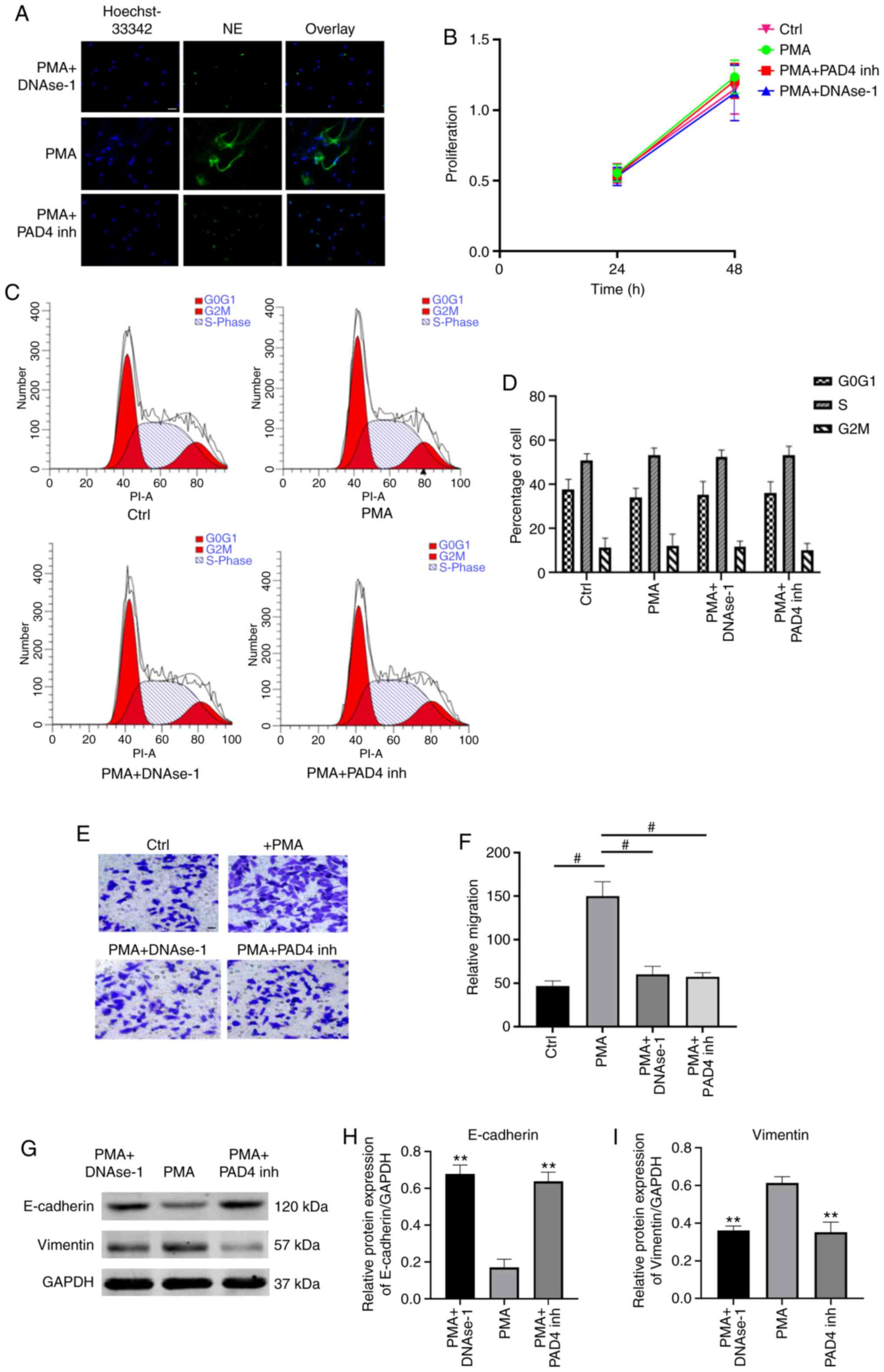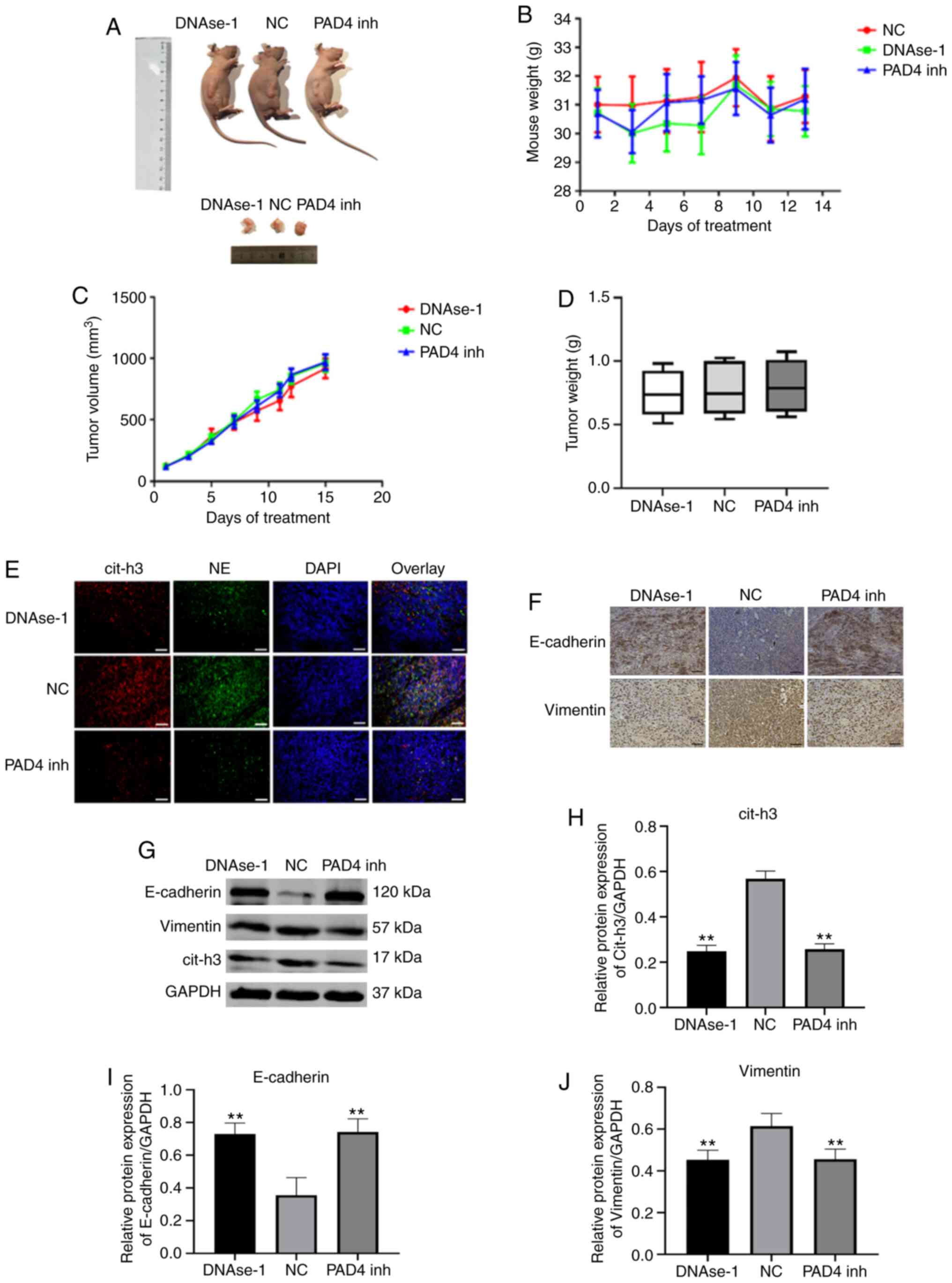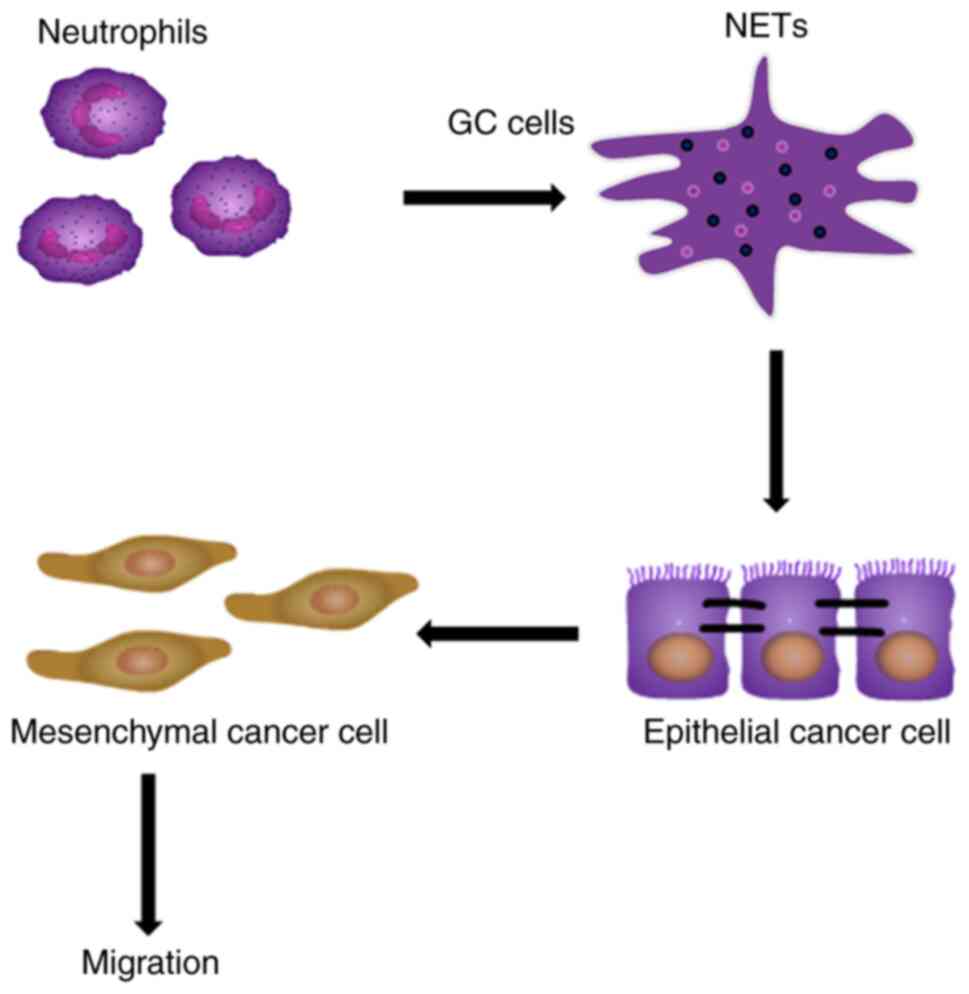|
1
|
Bray F, Ferlay J, Soerjomataram I, Siegel
RL, Torre LA and Jemal A: Global cancer statistics 2018: GLOBOCAN
estimates of incidence and mortality worldwide for 36 cancers in
185 countries. CA Cancer J Clin. 68:394–424. 2018. View Article : Google Scholar : PubMed/NCBI
|
|
2
|
Chen W, Zheng R, Baade PD, Zhang S, Zeng
H, Bray F, Jemal A, Yu XQ and He J: Cancer statistics in China,
2015. CA Cancer J Clin. 66:115–132. 2016. View Article : Google Scholar : PubMed/NCBI
|
|
3
|
Arneth B: Tumor microenvironment. Medicina
(Kaunas). 56:152019. View Article : Google Scholar
|
|
4
|
Quail DF and Joyce JA: Microenvironmental
regulation of tumor progression and metastasis. Nat Med.
19:1423–1437. 2013. View
Article : Google Scholar : PubMed/NCBI
|
|
5
|
Gonzalez H, Hagerling C and Werb Z: Roles
of the immune system in cancer: From tumor initiation to metastatic
progression. Genes Dev. 32:1267–1284. 2018. View Article : Google Scholar : PubMed/NCBI
|
|
6
|
Zhang X, Shi H, Yuan X, Jiang P, Qian H
and Xu W: Tumor-derived exosomes induce N2 polarization of
neutrophils to promote gastric cancer cell migration. Mol Cancer.
17:1462018. View Article : Google Scholar : PubMed/NCBI
|
|
7
|
Shaul ME and Fridlender ZG:
Tumour-associated neutrophils in patients with cancer. Nat Rev Clin
Oncol. 16:601–620. 2019. View Article : Google Scholar : PubMed/NCBI
|
|
8
|
Coffelt SB, Wellenstein MD and de Visser
KE: Neutrophils in cancer: Neutral no more. Nat Rev Cancer.
16:4314462016. View Article : Google Scholar
|
|
9
|
Liu Y and Liu L: The pro-tumor effect and
the anti-tumor effect of neutrophils extracellular traps. Biosci
Trends. 13:469–475. 2020. View Article : Google Scholar
|
|
10
|
Demers M, Krause DS, Schatzberg D,
Martinod K, Voorhees JR, Fuchs TA, Scadden DT and Wagner DD:
Cancers predispose neutrophils to release extracellular DNA traps
that contribute to cancer-associated thrombosis. Proc Natl Acad Sci
USA. 109:13076–13081. 2012. View Article : Google Scholar : PubMed/NCBI
|
|
11
|
Cedervall J, Hamidi A and Olsson AK:
Platelets, NETs and cancer. Thromb Res. 164(Suppl 1): S148–S152.
2018. View Article : Google Scholar : PubMed/NCBI
|
|
12
|
Berger-Achituv S, Brinkmann V, Abed UA,
Kühn LI, Ben-Ezra J, Elhasid R and Zychlinsky A: A proposed role
for neutrophil extracellular traps in cancer immunoediting. Front
Immunol. 4:482013. View Article : Google Scholar : PubMed/NCBI
|
|
13
|
Park J, Wysocki RW, Amoozgar Z, Maiorino
L, Fein MR, Jorns J, Schott AF, Kinugasa-Katayama Y, Lee Y, Won NH,
et al: Cancer cells induce metastasis-supporting neutrophil
extracellular DNA traps. Sci Transl Med. 8:361ra1382016. View Article : Google Scholar : PubMed/NCBI
|
|
14
|
Najmeh S, Cools-Lartigue J, Rayes RF,
Gowing S, Vourtzoumis P, Bourdeau F, Giannias B, Berube J, Rousseau
S, Ferri LE and Spicer JD: Neutrophil extracellular traps sequester
circulating tumor cells via β1-integrin mediated interactions. Int
J Cancer. 140:2321–2330. 2017. View Article : Google Scholar : PubMed/NCBI
|
|
15
|
Cools-Lartigue J, Spicer J, McDonald B,
Gowing S, Chow S, Giannias B, Bourdeau F, Kubes P and Ferri L:
Neutrophil extracellular traps sequester circulating tumor cells
and promote metastasis. J Clin Invest. 123:3446–3458. 2013.
View Article : Google Scholar :
|
|
16
|
Grilz E, Mauracher LM, Posch F,
Königsbrügge O, Zöchbauer-Müller S, Marosi C, Lang I, Pabinger I
and Ay C: Citrullinated histone H3, a biomarker for neutrophil
extracellular trap formation, predicts the risk of mortality in
patients with cancer. Br J Haematol. 186:311–320. 2019. View Article : Google Scholar : PubMed/NCBI
|
|
17
|
Erpenbeck L and Schön MP: Neutrophil
extracellular traps: Protagonists of cancer progression? Oncogene.
36:2483–2490. 2017. View Article : Google Scholar
|
|
18
|
Claushuis TA, de Stoppelaar SF, Stroo I,
Roelofs JJ, Ottenhoff R, van der Poll T and Van't Veer C: Thrombin
contributes to protective immunity in pneumonia-derived sepsis via
fibrin polymerization and platelet-neutrophil interactions. J
Thromb Haemost. 15:744–757. 2017. View Article : Google Scholar : PubMed/NCBI
|
|
19
|
Arelaki S, Arampatzioglou A, Kambas K,
Papagoras C, Miltiades P, Angelidou I, Mitsios A, Kotsianidis I,
Skendros P, Sivridis E, et al: Gradient infiltration of neutrophil
extracellular traps in colon cancer and evidence for their
involvement in tumour growth. PLoS One. 11:e01544842016. View Article : Google Scholar : PubMed/NCBI
|
|
20
|
Schedel F, Mayer-Hain S, Pappelbaum KI,
Metze D, Stock M, Goerge T, Loser K, Sunderkötter C, Luger TA and
Weishaupt C: Evidence and impact of neutrophil extracellular traps
in malignant melanoma. Pigment Cell Melanoma Res. 33:63–73. 2020.
View Article : Google Scholar
|
|
21
|
Gupta GP and Massagué J: Cancer
metastasis: Building a framework. Cell. 127:679–695. 2006.
View Article : Google Scholar : PubMed/NCBI
|
|
22
|
Pastushenko I and Blanpain C: EMT
transition states during tumor progression and metastasis. Trends
Cell Biol. 29:212–226. 2019. View Article : Google Scholar
|
|
23
|
Zhang W, Gu J, Chen J, Zhang P, Ji R, Qian
H, Xu W and Zhang X: Interaction with neutrophils promotes gastric
cancer cell migration and invasion by inducing
epithelial-mesenchymal transition. Oncol Rep. 38:2959–2966. 2017.
View Article : Google Scholar : PubMed/NCBI
|
|
24
|
Li S, Cong X, Gao H, Lan X, Li Z, Wang W,
Song S, Wang Y, Li C, Zhang H, et al: Correction to:
Tumor-associated neutrophils induce EMT by IL-17a to promote
migration and invasion in gastric cancer cells. J Exp Clin Cancer
Res. 38:1772019. View Article : Google Scholar : PubMed/NCBI
|
|
25
|
Rayes RF, Vourtzoumis P, Bou Rjeily M,
Seth R, Bourdeau F, Giannias B, Berube J, Huang YH, Rousseau S,
Camilleri-Broet S, et al: Neutrophil extracellular trap-associated
CEACAM1 as a putative therapeutic target to prevent metastatic
progression of colon carcinoma. J Immunol. 204:2285–2294. 2020.
View Article : Google Scholar : PubMed/NCBI
|
|
26
|
American Joint Committee on Cancer (AJCC):
Cancer Staging Manual. AJCC; Chicago, IL: 2016, https://cancerstaging.org/references-tools/deskreferences/pages/default.aspx.
|
|
27
|
Albrengues J, Shields MA, Ng D, Park CG,
Ambrico A, Poindexter ME, Upadhyay P, Uyeminami DL, Pommier A,
Küttner V, et al: Neutrophil extracellular traps produced during
inflammation awaken dormant cancer cells in mice. Science.
361:eaao42272018. View Article : Google Scholar : PubMed/NCBI
|
|
28
|
Li B, Liu Y, Hu T, Zhang Y, Zhang C, Li T,
Wang C, Dong Z, Novakovic VA, Hu T and Shi J: Neutrophil
extracellular traps enhance procoagulant activity in patients with
oral squamous cell carcinoma. J Cancer Res Clin Oncol.
145:1695–1707. 2019. View Article : Google Scholar : PubMed/NCBI
|
|
29
|
Hu Y, Li H, Yan R, Wang C, Wang Y, Zhang
C, Liu M, Zhou T, Zhu W, Zhang H, et al: Increased neutrophil
activation and plasma DNA levels in patients with pre-eclampsia.
Thromb Haemost. 118:2064–2073. 2018. View Article : Google Scholar : PubMed/NCBI
|
|
30
|
Schimmel M, Nur E, Biemond BJ, van Mierlo
GJ, Solati S, Brandjes DP, Otten HM, Schnog JJ, Zeerleder S and
Curama Study Group: Nucleosomes and neutrophil activation in sickle
cell disease painful crisis. Haematologica. 98:1797–1803. 2013.
View Article : Google Scholar : PubMed/NCBI
|
|
31
|
Yoo DG, Floyd M, Winn M, Moskowitz SM and
Rada B: NET formation induced by Pseudomonas aeruginosa cystic
fibrosis isolates measured as release of myeloperoxidase-DNA and
neutrophil elastase-DNA complexes. Immunol Lett. 160:186–194. 2014.
View Article : Google Scholar : PubMed/NCBI
|
|
32
|
Stakos DA, Kambas K, Konstantinidis T,
Mitroulis I, Apostolidou E, Arelaki S, Tsironidou V, Giatromanolaki
A, Skendros P, Konstantinides S and Ritis K: Expression of
functional tissue factor by neutrophil extracellular traps in
culprit artery of acute myocardial infarction. Eur Heart J.
36:1405–1414. 2015. View Article : Google Scholar : PubMed/NCBI
|
|
33
|
Abed AU and Brinkmann V:
Immunofluorescence labelling of human and murine neutrophil
extracellular traps in paraffin-embedded tissue. J Vis Exp.
151:e601152019.
|
|
34
|
Owen GR, Häkkinen L, Wu C and Larjava H: A
reproducible technique for specific labeling of antigens using
preformed fluorescent molecular IgG-F(ab′)2 complexes from primary
anti-bodies of the same species. Microsc Res Tech. 73:623–630.
2010.
|
|
35
|
Hu Z, Murakami T, Tamura H, Reich J,
Kuwahara-Arai K, Iba T, Tabe Y and Nagaoka I: Neutrophil
extracellular traps induce IL-1β production by macrophages in
combination with lipopolysaccharide. Int J Mol Med. 39:549–558.
2017. View Article : Google Scholar : PubMed/NCBI
|
|
36
|
Brinkmann V, Reichard U, Goosmann C,
Fauler B, Uhlemann Y, Weiss DS, Weinrauch Y and Zychlinsky A:
Neutrophil extracellular traps kill bacteria. Science.
303:1532–1535. 2004. View Article : Google Scholar : PubMed/NCBI
|
|
37
|
Nauseef WM and Borregaard N: Neutrophils
at work. Nat Immunol. 15:602–611. 2014. View Article : Google Scholar : PubMed/NCBI
|
|
38
|
Yang C, Sun W, Cui W, Li X, Yao J, Jia X,
Li C, Wu H, Hu Z and Zou X: Procoagulant role of neutrophil
extracellular traps in patients with gastric cancer. Int J Clin Exp
Pathol. 8:14075–14086. 2015.
|
|
39
|
Marin Oyarzún CP, Carestia A, Lev PR,
Glembotsky AC, Castro Ríos MA, Moiraghi B, Molinas FC, Marta RF,
Schattner M and Heller PG: Neutrophil extracellular trap formation
and circulating nucleosomes in patients with chronic
myeloproliferative neoplasms. Sci Rep. 6:387382016. View Article : Google Scholar : PubMed/NCBI
|
|
40
|
Oklu R, Sheth RA, Wong KHK, Jahromi AH and
Albadawi H: Neutrophil extracellular traps are increased in cancer
patients but does not associate with venous thrombosis. Cardiovasc
Diagn Ther. 7(Suppl 3): S140–S149. 2017. View Article : Google Scholar
|
|
41
|
Guglietta S and Rescigno M:
Hypercoagulation and complement: Connected players in tumor
development and metastases. Semin Immunol. 28:578–586. 2016.
View Article : Google Scholar : PubMed/NCBI
|
|
42
|
Brinkmann V: Neutrophil extracellular
traps in the second decade. J Innate Immun. 10:414–421. 2018.
View Article : Google Scholar : PubMed/NCBI
|
|
43
|
Wu L, Liang Y, Zhang C, Wang X, Ding X,
Huang C and Liang H: Prognostic significance of lymphovascular
infiltration in overall survival of gastric cancer patients after
surgery with curative intent. Chin J Cancer Res. 31:785–796. 2019.
View Article : Google Scholar : PubMed/NCBI
|
|
44
|
Abdol Razak N, Elaskalani O and Metharom
P: Pancreatic cancer-induced neutrophil extracellular traps: A
potential contributor to cancer-associated thrombosis. Int J Mol
Sci. 18:4872017. View Article : Google Scholar :
|
|
45
|
Richardson JJR, Hendrickse C, Gao-Smith F
and Thickett DR: Neutrophil extracellular trap production in
patients with colorectal cancer in vitro. Int J Inflam.
2017:49150622017. View Article : Google Scholar : PubMed/NCBI
|
|
46
|
Zhang Y, Wang C, Yu M, Zhao X, Du J, Li Y,
Jing H, Dong Z, Kou J, Bi Y, et al: Neutrophil extracellular traps
induced by activated platelets contribute to procoagulant activity
in patients with colorectal cancer. Thromb Res. 180:87–97. 2019.
View Article : Google Scholar : PubMed/NCBI
|
|
47
|
Arpinati L, Shaul ME, Kaisar-Iluz N, Mali
S, Mahroum S and Fridlender ZG: NETosis in cancer: A critical
analysis of the impact of cancer on neutrophil extracellular trap
(NET) release in lung cancer patients vs. mice Cancer Immunol
Immunother. 69:199–213. 2020. View Article : Google Scholar
|
|
48
|
Wu L, Saxena S and Singh RK: Neutrophils
in the tumor microenvironment. Adv Exp Med Biol. 1224:1–20. 2020.
View Article : Google Scholar : PubMed/NCBI
|
|
49
|
Hisada Y, Grover SP, Maqsood A, Houston R,
Ay C, Noubouossie DF, Cooley BC, Wallén H, Key NS, Thålin C, et al:
Neutrophils and neutrophil extracellular traps enhance venous
thrombosis in mice bearing human pancreatic tumors. Haematologica.
105:218–225. 2020. View Article : Google Scholar :
|
|
50
|
Andzinski L, Kasnitz N, Stahnke S, Wu CF,
Gereke M, von Köckritz-Blickwede M, Schilling B, Brandau S, Weiss S
and Jablonska J: Type I IFNs induce anti-tumor polarization of
tumor associated neutrophils in mice and human. Int J Cancer.
138:1982–1993. 2016. View Article : Google Scholar
|
|
51
|
Natalwala A, Spychal R and Tselepis C:
Epithelial-mesenchymal transition mediated tumourigenesis in the
gastrointestinal tract. World J Gastroenterol. 14:3792–3797. 2008.
View Article : Google Scholar : PubMed/NCBI
|
|
52
|
Wang Y, Chen J, Yang L, Li J, Wu W, Huang
M, Lin L and Su S: Tumor-contacted neutrophils promote metastasis
by a CD90-TIMP-1 Juxtacrine-paracrine loop. Clin Cancer Res.
25:1957–1969. 2019. View Article : Google Scholar
|
|
53
|
Hu P, Shen M, Zhang P, Zheng C, Pang Z,
Zhu L and Du J: Intratumoral neutrophil granulocytes contribute to
epithelial-mesenchymal transition in lung adenocarcinoma cells.
Tumour Biol. 36:7789–7796. 2015. View Article : Google Scholar : PubMed/NCBI
|
|
54
|
Wu Y, Zhao Q, Peng C, Sun L, Li XF and
Kuang DM: Neutrophils promote motility of cancer cells via a
hyaluronan-mediatedTLR4/PI3K activation loop. J Pathol.
225:438–447. 2011. View Article : Google Scholar : PubMed/NCBI
|
|
55
|
Zhou Q, Wang X, Yu Z, Wu X, Chen X, Li J,
Zhu Z, Liu B and Su L: Transducin (β)-like 1 X-linked receptor 1
promotes gastric cancer progression via the ERK1/2 pathway.
Oncogene. 36:1873–1886. 2017. View Article : Google Scholar
|
|
56
|
Molina JR and Adjei AA: The Ras/Raf/MAPK
pathway. J Thorac Oncol. 1:7–9. 2006. View Article : Google Scholar
|
|
57
|
Groner B and von Manstein V: Jak Stat
signaling and cancer: Opportunities, benefits and side effects of
targeted inhibition. Mol Cell Endocrinol. 451:1–14. 2017.
View Article : Google Scholar : PubMed/NCBI
|
|
58
|
Lim S and Kaldis P: Cdks, cyclins and
CKIs: Roles beyond cell cycle regulation. Development.
140:3079–3093. 2013. View Article : Google Scholar : PubMed/NCBI
|
















